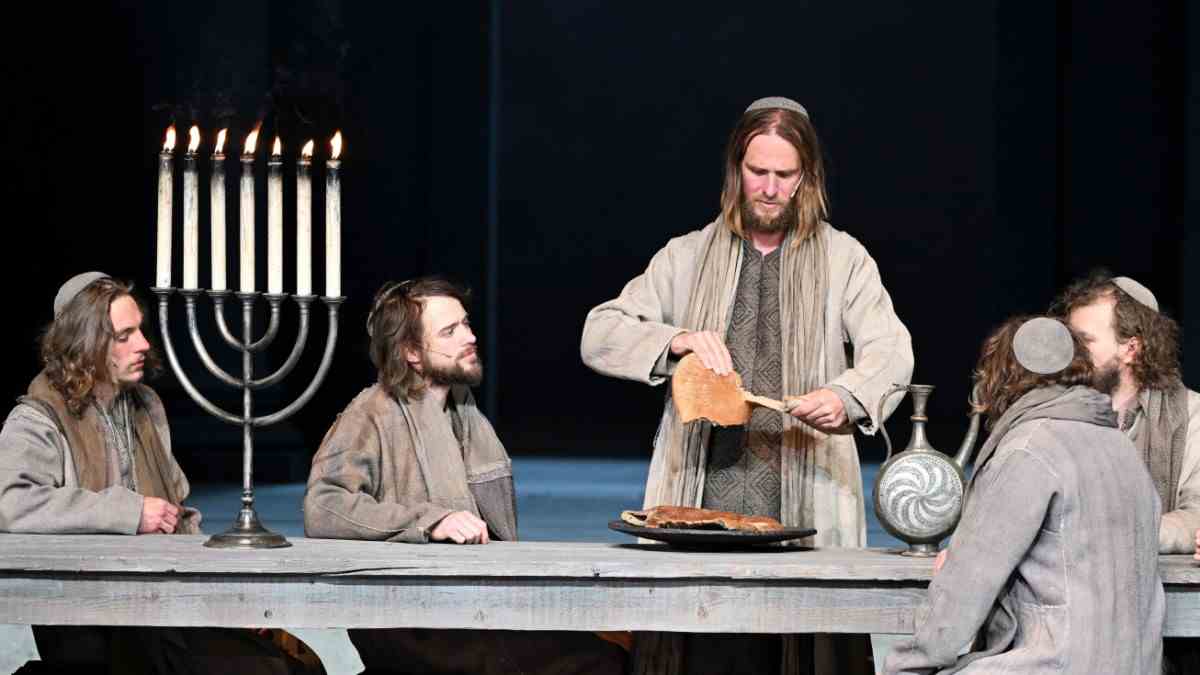The Passion Play in Oberammergau, which opened at the weekend, impressively demonstrates that the course of the world, with its twists and turns, can also be depicted on a small scale. More than ever, the story of Jesus’ suffering and death, which is re-enacted every ten years, stands for the search for an answer to a world full of crises and wars. And you have to have a cold heart not to be touched by the blazing fire that illuminates the deserted stage – as a small light of hope.
After a twelve-year break from the festival, Oberammergau has had an acclaimed premiere. Effort and zeal to fulfill the vow of a passion play made almost 400 years ago are growing ever stronger. At that time, the village saw it as its last hope of being freed from the scourge of the plague, and the village chronicle states that this was achieved.
This penchant for the musical and the theatrical
A continuum like this game has become rare in the modern world where many traditions are crumbling like houses of cards. Even in a formerly deeply Catholic country like Bavaria, religious customs and rituals are rapidly losing their dominance that once shaped life.
However, the history of the Oberammergau Passion has long transcended the concerns of religion. Based on the Passion of Christ, she sheds light on man’s striving to find his way in his mysterious existence. In the search for answers, the south of the country in particular – in contrast to the more sober Protestant north – reveals a deep inclination towards the musical and theatrical.
In the past, people’s curiosity was primarily satisfied in the churches. They were something like the multiplexes of the Baroque period, their splendor must have seemed like paradise to simple people who lived in crooked huts. The processions, the pilgrimages and the vows gave them a sensual experience that allayed their fears and worries in times when a visit to the doctor and all-round care were still a utopia and every cold could bring death. It is also wondrous how rough and lewd the ceiling frescoes were, and there was no lack of cheeky putti casually showing the bird to the viewer of the altar wall.
Today: construction of roads. Formerly: building churches
For centuries the people in their distress flocked to where miracles had taken place and where people had experienced salvation. Places like Andechs, Ettal and Altötting saw up to 50,000 pilgrims a day, and the fame of these pilgrimage sites soon spread throughout the world. Anyone who studies the votive images encounters the misery of this world at every turn, but also rescue from danger. It sounds strange, but the money that goes into sewerage, road construction and broadband today was used to build those churches where salvation was to be expected.
Continuities like the one in Oberammergau are not that rare. When the plague also raged in Salzburger Land, people there vowed they would make a pilgrimage to the most distant church that could be seen from its tallest tree. Since then they have carried huge candles to a church in Rottal every hundred years.
Or let’s take a look at the Maria Kulm pilgrimage church in the Czech diocese of Pilsen, where the proportion of Catholics is smaller than almost anywhere else in the Christian world. Crowds of pilgrims also made the pilgrimage there from Bavaria, regardless of the Hussite incursions, the Thirty Years’ War and the Nazi terror. When the Iron Curtain fell in 1989, people immediately took up the tradition again, while locals shook their heads in disbelief.
A village with 242 candidates – for the municipal council
The Passion Play held up just as stubbornly. They were cultivated in more than 300 villages in Bavaria and Tyrol until they were banned in 1770 because they were incompatible with the spirit of the Enlightenment. In Oberammergau, the passion probably only survived because painful changes were accepted. Game director Christian Stückl had to struggle for 30 years to modernize the game despite strong resistance. Because the desire to fight is also deeply rooted in the village. 242 candidates are said to have once applied for office in the municipal council. If you use Munich as a comparison, that would correspond to a number of more than 80,000 city council candidates.
However, the fact that they quarrel with such enthusiasm does not harm the people of Oberammergau. Rather, the dispute seems to strengthen their cohesion – and their inclination to lead the Passion Play into a future in which secular people will also seek stability and meaning. As quickly as faith and religion erode, there remains a need for meaningful experiences that cannot be grasped with the intellect. The Oberammergau phenomenon will probably live on from this longing for a long time to come.

